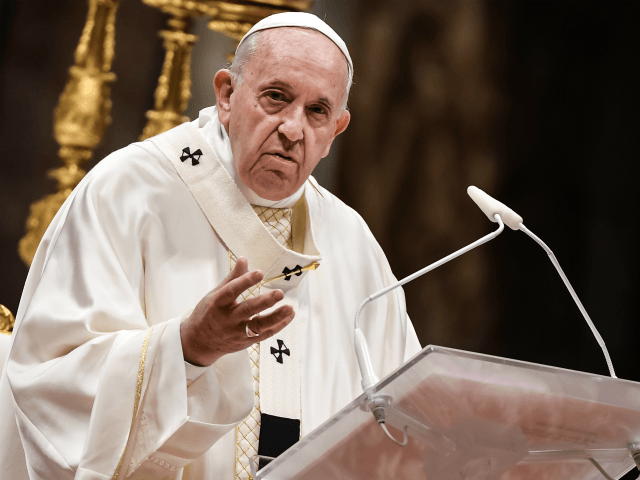ROME — Pope Francis reiterated his opposition to “just war theory” Friday, asserting that “war always diminishes us.”
Following a Vatican screening of the documentary “Freedom on Fire: Ukraine’s Fight for Freedom” by director Evgeny Afineevsky, the pontiff condemned all war without distinction in an impromptu address to those present, including members of the Ukrainian community in Rome.
“When God made man, he said to take the earth, make it grow, make it beautiful,” the pope declared. “The spirit of war is the opposite: to destroy, to destroy, not to let grow, to destroy everyone, men, women, children, the elderly, everyone.”
“Today marks one year of this war,” he continued. “Let us look at Ukraine, let us pray for Ukraine and open our hearts to sorrow.”
“Let us not be ashamed to suffer and weep, for a war is destruction, a war always diminishes us. May God make us understand this,” he concluded.
Francis’ words reiterated an assertion he has repeatedly made, namely that contrary to the millennial Catholic tradition, there is no such thing as a just war.
“Once even in our Churches there was talk of holy war or just war,” Francis told Moscow Patriarch Kirill last March. “Today one can no longer speak like that. Wars are always unjust.”
Whereas popes of the past have been attentive to formulating their teachings regarding war and peace in precise terminology, with great respect for the Church’s ancient teaching on conditions for a just war, Francis has been willing to simply discard and discredit the entire tradition.
In the 13th century, the great theologian and doctor of the Church, Thomas Aquinas, laid out a careful teaching on the conditions necessary to justify waging war, on the premise that war was sometimes just and sometimes unjust.
Picking up on the teaching of his predecessor Saint Augustine, Aquinas wrote that those who exercise public authority are charged with the care of the common good, and thus “as it is lawful for them to have recourse to the sword in defending that common weal against internal disturbances,” so too, “it is their business to have recourse to the sword of war in defending the common weal against external enemies.”
In the same vein, the Catechism of the Catholic Church, a compendium of official Church teaching, instructs that a series of conditions are necessary to justify the use of military force.
It states that “the damage inflicted by the aggressor on the nation or community of nations must be lasting, grave, and certain; all other means of putting an end to it must have been shown to be impractical or ineffective; there must be serious prospects of success; the use of arms must not produce evils and disorders graver than the evil to be eliminated.”
“These are the traditional elements enumerated in what is called the ‘just war’ doctrine,” the Catechism declares.
The Catechism also states that those who serve their country in the armed forces “are servants of the security and freedom of nations. If they carry out their duty honorably, they truly contribute to the common good of the nation and the maintenance of peace.”

COMMENTS
Please let us know if you're having issues with commenting.